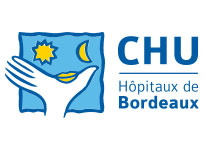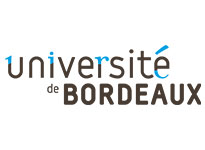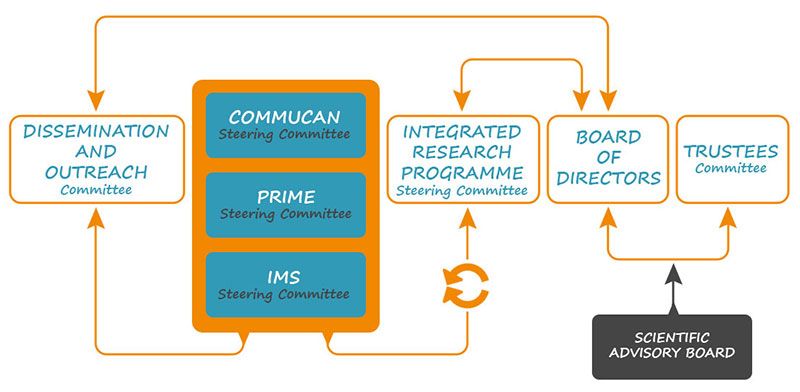Trustees and governance
BRIO’s trustees are the Bordeaux University Hospital, the Bergonié Institute, the University of Bordeaux, Inserm and the CNRS.



BRIO is made up of teams from two hospitals (Bergonié Institute and Bordeaux University Hospital), the University of Bordeaux and various INSERM and CNRS research units. SIRIC BRIO also collaborates with the Aquitaine Cancer Network (RCA) which includes 51 public and private hospitals as well as more than 1000 doctors. The type of governance chosen for BRIO promotes optimal organization and stimulates precise project management.

Five committees have been created and are consulted on a regular basis:
The Management Committee
The Board of Directors defines BRIO‘s policy and strategies in accordance with the decisions of the Trusteeship Committee (see below). It is responsible for validating any changes in research programs and developing calls for projects. Its members meet four times a year and are:
Professor Pierre Soubeyran (Professor of Oncology, Director of Unit U1218 Inserm, Director of Research at the Bergonié Institute)
Doctor Julie Dechanet-Merville (Director of Research at the CNRS, Director of UMR 5164 ImmunoConcEpT)
Professor Alain Ravaud (Professor of Oncology, Director and Coordinator of the Department of Oncology at CHU Bordeaux)
Professor Simone Mathoulin-Pelissier (Professor in Epidemiology and Public Health, Director of the EPICENE team, Inserm U1219)
The Trustees Committee
The Trustees Committee, chaired by the Director of BRIO, Professor Pierre Soubeyran, meets once a year. The purpose of this committee is to guide, validate and ensure the implementation of BRIO‘s strategy and objectives with the Management Committee. Its role is also to vote the annual budget of SIRIC BRIO on the basis of a discussion between the different partners contributing to BRIO. The Trusteeship Committee also decides to accept, reject or exclude certain members. The representation of each of the SIRIC BRIO partner organizations is guaranteed and includes the Bergonié Institute, the University of Bordeaux, the Bordeaux University Hospital, the Inserm, the CNRS, the Regional Council, the Cancéropôle. Since 2017, BRIO has developed its patient involvement strategy by integrating two patients into its tutelage committee.
The members of the Trustees Committee are currently:
Bergonié Institute: Professor François-Xavier Mahon (Director)
University of Bordeaux: Professor Manuel Tunon de Lara (President of the University)
CHU Bordeaux: Mr. Yann Bubien (General Director of Bordeaux University Hospital)
Inserm: Doctor. Richard Salives (Regional Delegate)
CNRS: Mr. Younis Hermès (Regional Delegate)
Cancéropôle Grand Sud-Ouest: Professor Gilles Favre (Director Cancéropôle GSO)
BRIO: Professor Pierre Soubeyran (Director) and his assistants Doctor Julie Dechanet-Merville, Professor Alain Ravaud, Professor Simone Mathoulin-Pélissier
Patient: Mrs. Martine Rogerio, Mr. Pascal Berteau
The Scientific Council – Scientific Advisatory Board
The Scientific Advisory Board is made up of 8 internationally renowned researchers covering the five SIRIC disciplines (clinical research, biological, epidemiology, public health, human and social sciences) with expertise in the three BRIO programs. The role of the SAB is to provide an expert opinion on BRIO‘s research strategy and results. The progress of SIRIC is presented to the SAB once a year. To learn more, click here.
The Dissemination and Mediation Committee
The Dissemination and Outreach Committee meets three times a year. It is responsible for identifying opportunities and potential synergies to disseminate knowledge and practices to the general public, patients, and health and research professionals. To this end, he develops a dissemination program and suggests tools and formats for communication and mediation. Committee members use their own tools and networks to communicate and facilitate contacts.
The Steering Committee of Integrated Research Programs
The Integrated Research Program Steering Committee monitors the progress of the programs according to the objectives and predefined steps. It identifies opportunities for valorisation and defines possible strategies to support them. This committee is also responsible for making returns to the Management Committee.
